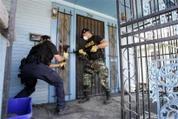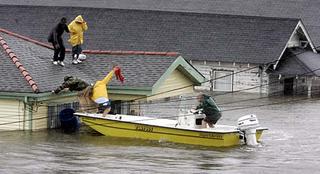
NEW ORLEANS, Sept 8 - The hunt for the helpless and the hiding went on across New Orleans on Thursday as President George W. Bush promised to streamline the government bureaucracy to speed relief to the hundreds of thousands displaced by Hurricane Katrina.
In New Orleans, once home to 450,000 people, rescue teams hunted door to door for what may be as many as 10,000 people, some refusing to leave despite an evacuation order and pernicious flood waters, others perhaps still trapped.
CNN reported that shrimp fishermen had found 14 bodies inside an abandoned hospital in the eastern side of the city. Earlier 30 corpses were found inside a nursing home.
Officials have 25,000 body bags on hand for the gruesome clean-up operation, and while some have speculated the toll could reach into the thousands no one knows for sure how many lives were lost. Some say victims may have been washed out to sea or buried under sludge.
"We saw a lot of dead people, both in the water and in buildings," said South Carolina game warden Gregg Brown, whose team scoured flooded New Orleans neighborhoods by boat.

FLOATING CORPSES
Rescue teams tied floating corpses to trees or fences for future recovery, and a morgue set up outside the city stood ready to receive more than 5,000 bodies.
At least 30 bodies were found at the St. Rita's nursing home in St. Bernard Parish east of New Orleans, Louisiana state Sen. Walter Boasso said. He said as many as three dozen other residents were rescued from the facility.
In the bohemian neighborhood of Bywater, which escaped relatively unscathed, troops stepped up the pressure on residents to abandon the city.
"They came around last night and told us we had to get our asses out by 6 p.m. today," said Blaine Barefoot, a 41-year-old street musician who was getting ready to leave. "I'm not going to fight it."
Helicopters clattered overhead and National Guard troops peered into windows of homes in search of the sick or dying, the dead, and those resisting efforts to evacuate them.
"Certain people are hiding out and are not going to leave. They've got pets, and they ain't leaving them behind," said Adrian Tate, a carpenter with a pit bull dog, although he conceded he would now obey the orders to leave.
"I have no choice."
Vice Admiral Thad Allen, the U.S. Coast Guard chief of staff named this week to take over the federal response in New Orleans, said authorities would comb the city block-by-block, knocking on doors to find stragglers.
"We need everybody out so we can continue with the work of restoring this city," Allen said on the CBS "Early Show."
Katrina's survivors have been without fresh water and electricity in oppressive heat since Katrina roared in and levee breaks flooded most of New Orleans, one of the world's most famous cities and home to about 450,000 people.
About one million people were forced from their homes along the Gulf Coast.
So far, the official death tolls stand at 83 in Louisiana and 201 in Mississippi, but officials say they expect to find thousands of bodies in the attics of flooded homes and the rubble of destroyed towns and cities.
Congress was set to pass $51.8 billion in new hurricane relief on Thursday. The federal government has exhausted a $10.5 billion fund approved by Congress just a week ago.
The Congressional Budget Office said 400,000 jobs could be lost and the nation's economic growth slashed by up to one percentage point by the disaster.
With the high death toll and a national recovery effort that may cost taxpayers $150 billion to $200 billion there was widespread criticism of the federal response to the disaster and new concerns in Congress over controlling the money headed toward the effort.
"It's just a lot of money and people are worried that it's done correctly," said Rep. Ray LaHood (news, bio, voting record), an Illinois Republican who serves on the House Appropriations Committee.
One success story came earlier this week when Army engineers filled wide breaches inthe levees with rocks and sand, and started pumping water out of flooded districts.
As much as 60 percent of New Orleans remained under water but state officials said on Thursday that city area pumps are now pushing out about 60,000 gallons of water per second.
(Additional reporting by Jim Loney in Baton Rouge, Adam Tanner in Houston and Maggie Fox in Washington)

0 Comments:
Post a Comment
<< Home